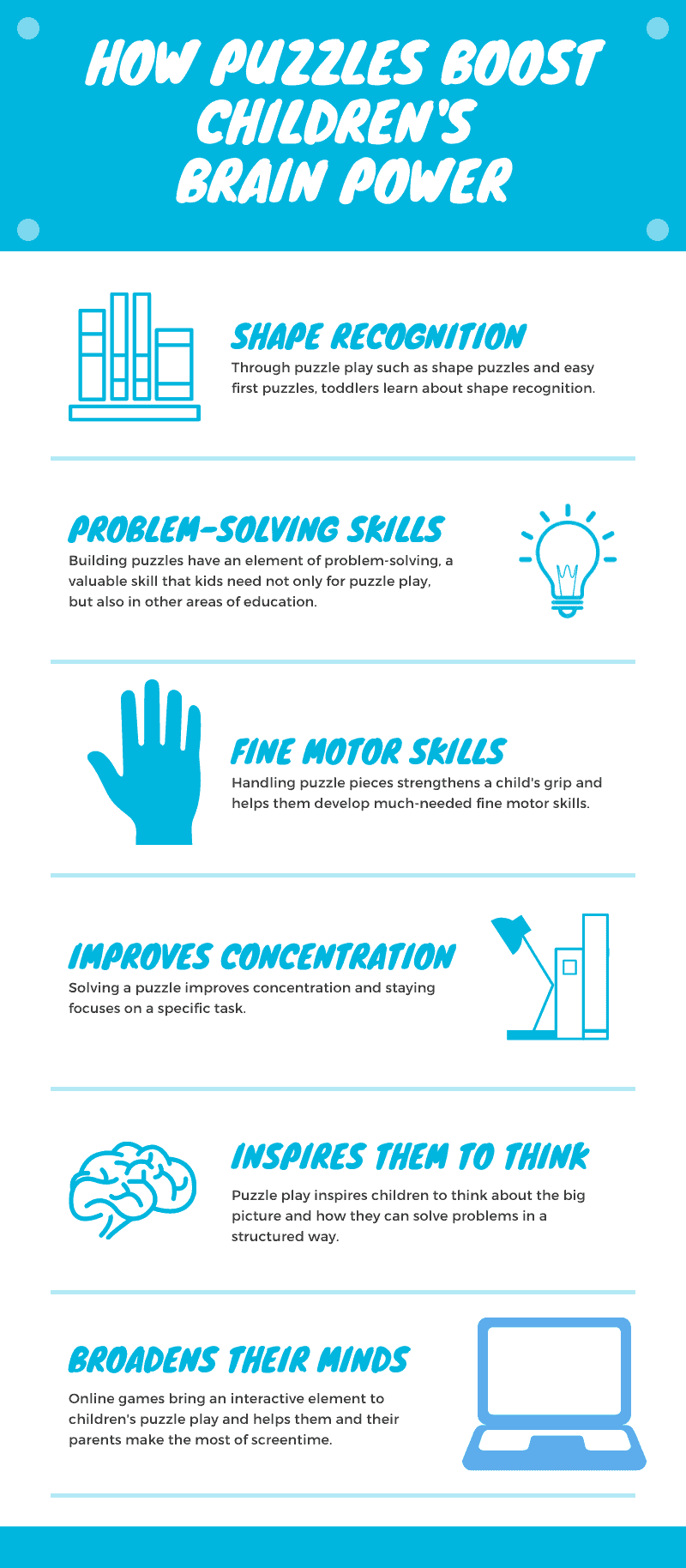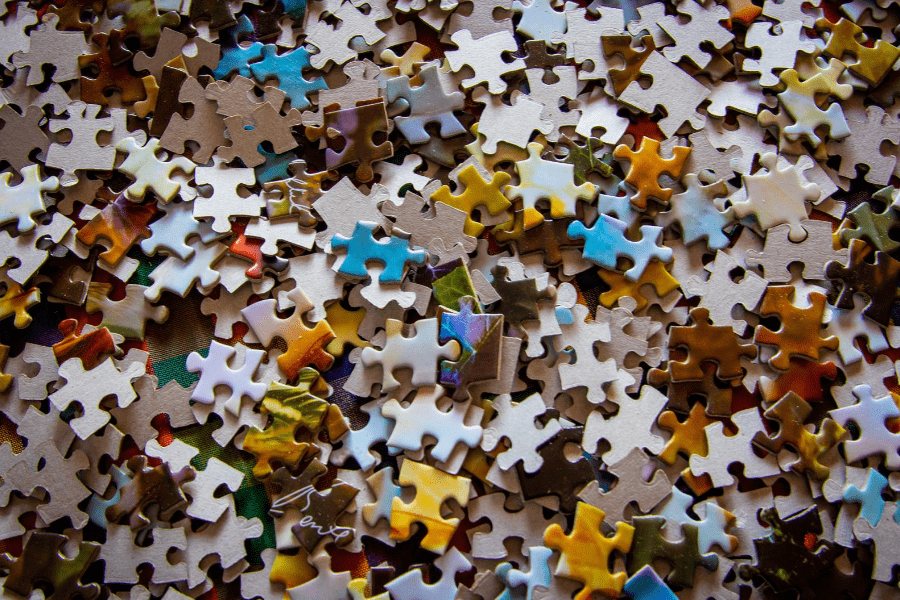Did you know that the first jigsaw puzzle was invented in 1767 by John Spilsbury, an engraver and cartographer? Or that the first puzzle video games were around as early as the late 70s?
Whether done as a hobby or for personal development, there is no question that puzzles bring with them a sense of satisfaction once completed. The same can be said for other popular brain teaser puzzle formats, such as the number-based soduko and crosswords – and even digital puzzles!
Your favorite pastime, however, is more than just slipping the right pieces into the right places or filling in the right numbers or letters. It unlocks a world of possibilities by boosting your brain power and cognitive abilities, shaping your problem-solving skills and helping you to work out complex problems and concepts.
Curious to find out more? Have a look below for our list of key brain-boosting benefits that puzzles have for kids and adults.
Puzzle Benefits For Children

Source: Teach.com
Physical, real-life puzzles are usually the first encounter that little ones have with the concept of building and solving these games. It plays an important part in educational playtime – but, luckily, it comes with a lot of fun and enjoyment too!
During early childhood development, puzzles play a key role in a toddler and preschooler’s development. One of the first instances where children get their first taste of puzzles comes with puzzle shapes that they need to fit into a matching slot – which teaches them about shape recognition and looking for similar shapes to match up, such as circles, triangles and squares. This, in turn, builds their vocabulary too.
Puzzle building also teaches kids about logic and problem-solving. Whether they are slotting little dinosaur shapes into a puzzle board or figuring out an easy 12-piece puzzle, they are boosting their concentration skills to figure out solutions for this “challenge”. They are inspired to think about how they will finish their puzzle and how they need to get there.
At the same time, they are improving their fine motor skills as they grip each little puzzle piece, which will help them with their pencil grip and handwriting as they get a little older.

Once kids reach their primary school years, they without a doubt are getting more interested in computers and, even more so, digital games. Puzzles are a great way to help them make the most of their screen time – plus it can help them broaden their minds if there is an educational element such as word recognition and reading associated with the game they are playing.
Perks Of Puzzle Time For Adults

As adults, we might not always have the same amount of time we had as when we were kids to enjoy completing puzzles. But this doesn’t mean not making the time for this activity.
Building puzzles, or engaging in crossword and soduko puzzles are perfect for brain stimulation. It can help you exercise your mind to be more productive at work and stay in your groove by strengthening your brain.
Just like its big benefits for kids, adults can also improve their concentration skills through puzzles and work on their cognitive ability and memory. However, an even more important brain-boosting benefit is lowering stress levels by enjoying a puzzle activity, which allows you to be more relaxed and better equipped with handling difficult tasks and problems.
Why You Should Do Puzzles Often

According to Marcel Danesi, author of The Total Brain Workout: 450 Puzzles to Sharpen Your Mind, Improve Your Memory, and Keep Your Brain Fit, “specific types of puzzles can be used to stimulate particular areas of the brain”. Some of his examples include language-based puzzles such as riddles that would, for instance, fuel the language areas of the brain, and logical thinking-based puzzles like symbols in grids.
Considering how doing puzzles often give your brain a full workout, it is more than enough reason to do puzzles often – and inspiring your family to do the same! Have a look below at some of the real-life and digital puzzles that we recommend for kids and adults.
Puzzles For Toddlers And Preschoolers

When it comes to puzzle games and brain teasers for kids, the brighter and more colorful, the better! Especially younger kids are easily drawn to vibrant puzzles and familiar shapes, so keep this in mind if you are considering a puzzle activity for your child.
- Let them have fun with knob puzzles
Knob puzzle pieces are easy to grip and place, which makes it easy for younger children to handle. Parents can invest in character or animal shapes that will captivate little imaginations. For a little extra brain boosting, it is a great idea to chat with a child about their animal or character shape – such as where a giraffe comes from or what a zebra eats. This will add an extra element of imaginative play too, which is great for cognitive development!
- Teach them about shapes and color
Colorful shape puzzles are perfect for pre-schoolers and will boost their brain power as they develop their special awareness and creativity.
- Learn with letters and numbers
Toddlers who are introduced to letters and numbers to prepare them for eventually making the move to primary school will love these types of games that teach them number and letter recognition. Plus, they will have fun slotting in the different shapes where they fit in!
Puzzles For Older Kids

Older kids are usually more comfortable with puzzles that need a little more grit to solve. Here are a few picks that are suited for kids who are ready to for the next challenge.
- Big, colorful puzzles

Curious little explorers will get a kick out of explorer map-type puzzles. With the chance to delve into interesting trivia, it is a great activity for them to learn about the concept of geography and a sense of place as they build the different cities to form a whole. This will also help them expand their knowledge of the world.
If you’re lucky, kids may even start to grasp that they aren’t always the center of the universe!
Puzzle Games And Brain Teasers For Adults

There are many puzzle activities for adults to enjoy and become engrossed in. Whether real-life or digital and mobile-friendly, getting that all-important brain boosting fix every day can be easy if you choose puzzle and brain teasers that suit your schedule.
Doing a 1000-piece puzzle can be the ultimate challenge for any adult – made all the more fun if it becomes part of a family activity. Many designs offer contemporary imagery such as famous artworks
Whether easy or hard, soduko is an approachable brain teaser to figure out number sequences. Some books also include free digital downloads, which means you can take your puzzle play on-the-go.
This android and desktop-friendly app offers bite-size puzzle games of various playing level (9-pieces, 25-pieces, 100-pieces and 225-pieces). It is perfect if your time is limited during the day but you would still love to get some puzzle play into your day.
Crossword puzzles needn’t be limited to newspapers or magazines – you can complete many of these popular brain teasers from the comfort of your mobile device! Crossword Puzzle Free offers thousands of crossword puzzles from indie and industry leader crossword constructors for free, which means wherever you are, you will be able to finish a crossword puzzle – at home or during your lunch hour.
Twisting, pulling apart and putting everything back in sequence again makes playing with a Rubik’s cube one of the most fun puzzle activities. With many varieties available, such as the standard square, a triangle or hexagon-shape, it is a great activity for exercising problem-solving skills.
Just don’t let your kid google the answer before trying.
Make Puzzle Play A Part Of Daily Lives

Puzzle play and brain teasers needn’t feel like a chore – it can become a fun learning activity that you and your family engage in daily. The most important thing is to keep things entertaining and light – don’t make it just another task to tick off on your to-do list!
With many families and couples currently limiting movement and social distancing, these brain boosting activities are perhaps the best answer to offer respite from the demands of everyday life. So, why not start your puzzle building ritual today? There are so many rewards for when you do!








